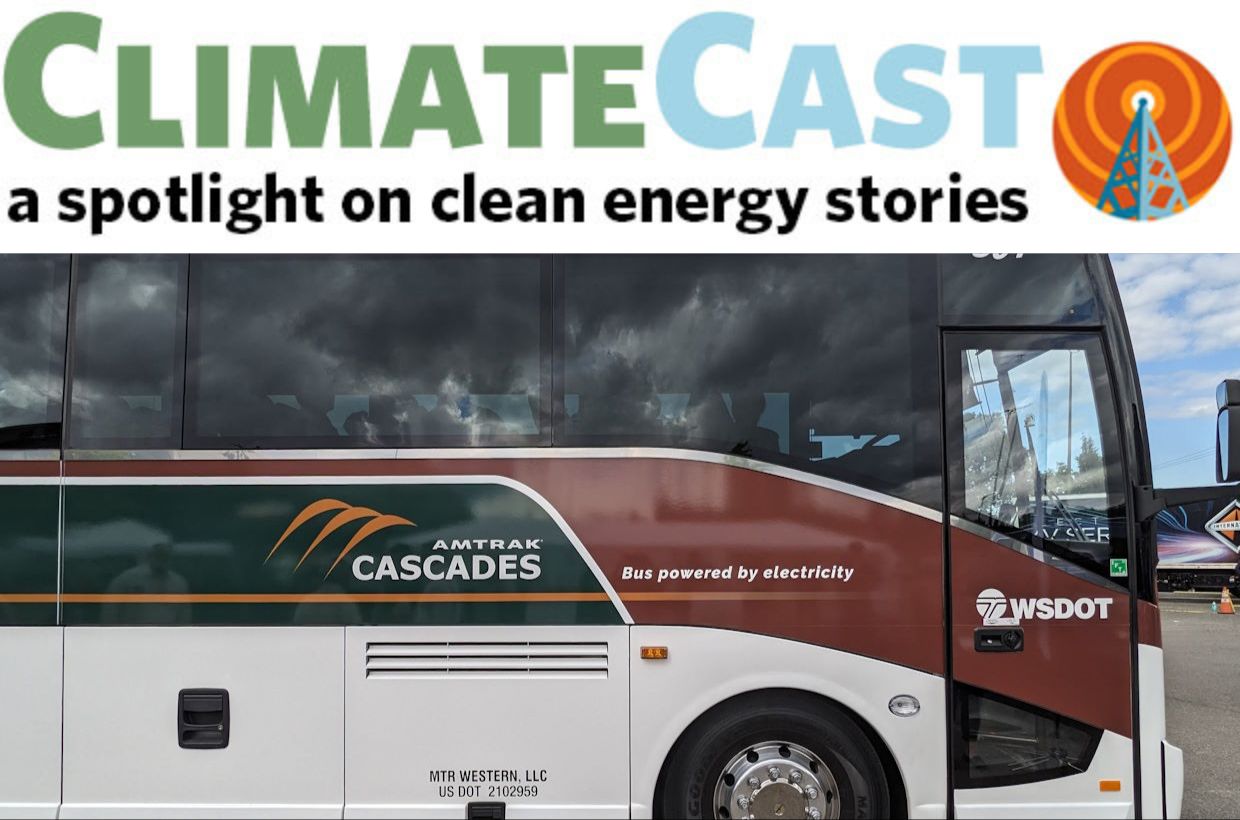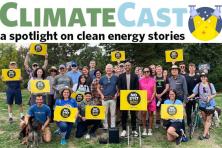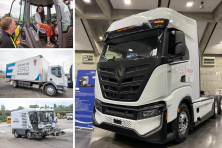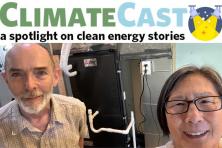Each month, ClimateCast features a Story Spotlight, covering climate issues and clean energy solutions that prioritize human experiences and connections in communities across the Pacific Northwest.
A passenger coach bus pulls into Amtrak’s Bellingham, WA station, but there’s no roaring engine or belch of diesel exhaust next to the passengers waiting to board. The loudest noise comes from the tires crunching on loose gravel in the driveway as the bus comes to a stop. The front doors whoosh open, and dozens of passengers emerge, ready to return home, see the sights in beautiful Whatcom County, or continue their journeys north or east.
Does this sound like a glimpse into the future? This isn’t any ordinary intercity bus trip; it’s the first scheduled Amtrak Thruway route in the United States served by a pollution-free, electric-powered motorcoach. And it’s operating right now, thanks to a small business going against the grain, aiming to be the first all-electric coach bus company — not only taking care of passengers by providing a clean, healthy, and quiet ride but also helping the communities its buses travel through by being a pollution-free bus traveling on the streets and highways.
MTRWestern — a transportation logistics company based in Seattle, Washington — operates a fleet of motorcoaches that provide charter, shuttle, and scheduled passenger bus services across the Pacific Northwest. Unlike many of its peers, MTRWestern has embraced pollution-free transportation solutions as an integral part of its business model. This isn’t the company’s first foray into electric motorcoaches; MTRWestern, with the support of several community partners (including Climate Solutions), borrowed an all-electric motorcoach back in 2022 to conduct pilot studies on the feasibility and logistical changes needed to operate all-electric coaches in revenue service. The company also got a leg up on its zero-emissions fleet education and planning by participating in the inaugural Fleet Decarbonization Accelerator program offered by the Breaking Barriers Collaborative.
Are you a business leader with a fleet?
Sign up for the Breaking Barriers Collaborative's Fleet Decarbonization Accelerator program.
Their actions will make a big difference, as transportation remains the region’s largest source of air pollution, and heavy-duty diesel-powered vehicles like buses, big-rig drayage trucks, and flatbeds produce a massive amount of it. That noxious cloud of diesel exhaust does far more harm than making passers-by cough; it’s a nasty mix of soot (aka “particulate matter”), carbon dioxide and monoxide gases, and other combustible byproducts that are bad for your lungs, harmful to the environment, and worsening the climate crisis. On top of that, as a legacy of historically racist housing and economic policies like gentrification and redlining, this pollution disproportionately harms communities of color, low-income families, and other frontline and marginalized communities.
MTRWestern’s journey into pollution-free electric coaches hasn’t been bump-free. During its 2022 pilot, the company learned that there are very few public charging stations that can rapidly recharge such a large vehicle, so MTRWestern invested in private charging infrastructure to keep its growing electric fleet juiced up. Other logistical challenges, like harmonizing schedules with new recharging and maintenance needs, have required some internal reshuffling and a bit of ingenuity. However, the company remains committed to growing its fleet of pollution-free vehicles and advocating for public investment in EV infrastructure and a cleaner transportation system overall.
Companies like MTRWestern are stepping up to tangibly reduce their air and climate pollution — while demonstrating that clean energy solutions can support their business models. And they're reducing the harmful effects of pollution on the communities in which they operate; that's a whole lot of benefit.
Editor's Note: This article is informational. Climate Solutions does not endorse or advertise any commercial product or service unless otherwise specified.
One thing you can do
Learn more about the business case for operating a pollution-free fleet at this free webinar on Wednesday!
What we're listening to
Science fiction author Kim Stanley Robinson focused his attention on real-world climate catastrophe in his novel "The Ministry for the Future." Podcast host Azeem Azhar speaks with Robinson not only about his climate pessimism, but also his utopian hope that we can “dodge a mass extinction event.”





